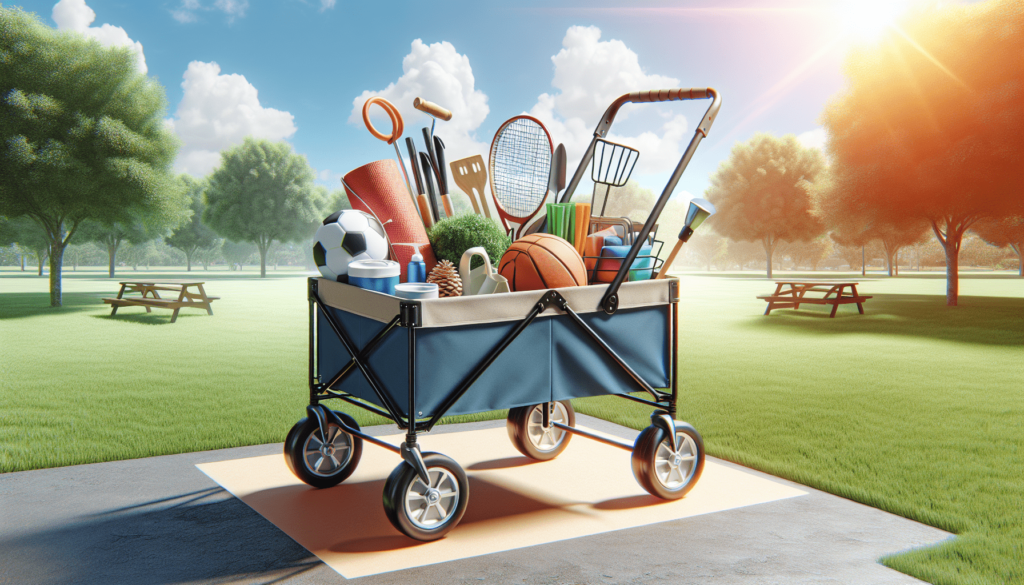Have you ever found yourself wondering how much weight your folding wagon can handle? Perhaps you’re planning an outing that requires carrying supplies or equipment, and you want to ensure that your trusty wagon can manage the load. Understanding the weight capacity of your folding wagon is crucial for not only making your adventures enjoyable but also for ensuring safety and longevity for the wagon itself.

Understanding Weight Capacity
It’s important to realize that every folding wagon comes with a specific weight capacity. This number signifies the maximum weight the wagon can accommodate without risking damage or compromise. Selecting a wagon that matches your needs is key to optimizing its use.
Why Does Weight Capacity Matter?
Weight capacity matters for several reasons. First and foremost, exceeding it can lead to safety issues. Nobody wants a wagon that collapses under load while you’re out enjoying the day. Moreover, keeping within the weight limit helps maintain the structural integrity of your wagon, ensuring it lasts longer and requires fewer repairs.
Factors Influencing Weight Capacity
Various factors can influence the weight capacity of a folding wagon. Understanding these elements can help guide your decision-making process.
-
Materials: The materials used in constructing the wagon play a significant role in its overall capacity. For instance, steel frames generally offer higher weight limits compared to aluminum ones, but they may also be heavier.
-
Design: The design of the folding wagon, such as its frame structure, wheel composition, and overall geometry, greatly impacts how much weight it can carry safely.
-
Wheels: Larger wheels can provide better stability and allow the wagon to transport heavier loads over different terrains.
Evaluating Your Needs
To best assess what weight capacity you need, it helps to consider how you will be using your wagon.
Common Uses for Folding Wagons
Folding wagons are often used in various scenarios, including:
-
Outdoor Activities: Camping, beach trips, or picnics might require carrying coolers, blankets, and sporting gear.
-
Shopping: If you’re using the wagon for grocery runs or transporting items from your vehicle, the weight of your purchases could add up.
-
Events: Whether you’re at a festival, farmer’s market, or concert, a wagon can facilitate the transport of food, drinks, or supplies.
Estimating Your Load
Once you know what you’ll be using the wagon for, you’ll want to estimate the weight you’re likely to carry. It can be useful to create a list of items and their respective weights. Here are a few examples you might consider:
| Item | Estimated Weight (lbs) |
|---|---|
| Cooler | 30-50 |
| Blankets | 5-10 |
| Sports Equipment | 10-20 |
| Groceries | 50-100 |
| Event Supplies | 15-30 |
Assessing Total Weight
The next step is to add up the expected weight of the items you’ll carry in your wagon based on your list. This will provide a rough estimate of how much capacity you need. After tallying up the weights, consider a factor of safety by adding an extra 10-20% to your total. This ensures you won’t be at risk of exceeding the weight limit.
Selecting the Right Wagon
Now that you’ve assessed your needs, it’s time to look into selecting a folding wagon that meets those requirements.
Key Features to Look for
When searching for a folding wagon, focus on these essential features that can help ensure you choose a suitable option:
-
Weight Capacity Rating: Always check the manufacturer’s listed weight capacity. This will be your primary guide in the selection process.
-
Frame Strength: Look for a wagon with a sturdy frame that can withstand heavy weights. A steel frame is often preferable over plastic.
-
Wheel Design: Larger, all-terrain wheels can provide better handling and are crucial if you plan to traverse uneven surfaces.
-
Ease of Folding: Ensure the wagon folds easily and can be stored without hassle.
Recommendations
With an understanding of features, here are some popular folding wagons that boast high weight capacities:
-
WonderFold Wagon – Known for its large capacity, this wagon can carry around 150 lbs, making it suitable for family outings.
-
Coleman Folding Wagon – Great for carrying camping gear, it has a weight limit of about 150 lbs and is made from durable materials.
-
Radio Flyer Ultimate Folding Wagon – This wagon combines versatility with a weight capacity of 200 lbs and includes additional features like cup holders.
-
Kaddy Wagon – An economical option with a solid weight capacity of 110 lbs, perfect for light transport needs.
Each of these options caters to different uses, so it’s important to consider your specific needs and preferences.

Properly Loading Your Folding Wagon
Once you’ve selected the perfect wagon, knowing how to load it correctly is equally important to ensure safety and maintain the wagon’s longevity.
Distributing Weight Evenly
When loading your wagon, aim to distribute the weight evenly. This helps prevent tipping and ensures better maneuverability. Place heavier items on the bottom and towards the center for better stability.
Avoiding Overloading
Never exceed the manufacturer’s recommended weight. If you find that your load is nearing the weight capacity, consider leaving some items behind or finding alternative ways to transport them.
Adjusting for Terrain
If you’re navigating uneven surfaces, modify your load to account for swaying. For example, consider placing heavier items lower in the wagon and positioning lighter items on top to enhance balance.
Maintenance Tips for Longevity
To keep your wagon in good shape, proper maintenance can extend its life and ensure it’s always ready for your next adventure.
Regular Inspections
Periodically inspect your folding wagon for signs of wear and tear. Look for any frayed fabric, loose wheels, or bent frames. Addressing these issues early can prevent bigger problems later on.
Cleaning
Regular cleaning can prevent buildup that may compromise the wagon’s materials. Use mild soap and water to remove dirt, grime, and stains, but avoid harsh chemicals that could damage the fabric.
Storage
When not in use, store your wagon in a dry, cool place. Avoid leaving it exposed to elements like direct sunlight or harsh weather conditions, which can deteriorate materials over time.
Lubrication
For wagons with moving parts like wheel bearings, regular lubrication is important. This will ensure smooth operation and prevent rust and corrosion.
Conclusion
Assessing weight capacity needs for your folding wagon is a multifaceted process that relies on understanding the wagon’s specifications, estimating your load, and carefully selecting the right product. By taking the time to evaluate your needs and maintain your wagon, you can create a more enjoyable experience during your outdoor adventures.
Remember, taking safety and capacity into account ensures that your folding wagon remains a reliable companion for many trips to come. So go ahead, feel confident to load up and hit the great outdoors with your trusty wagon by your side!

